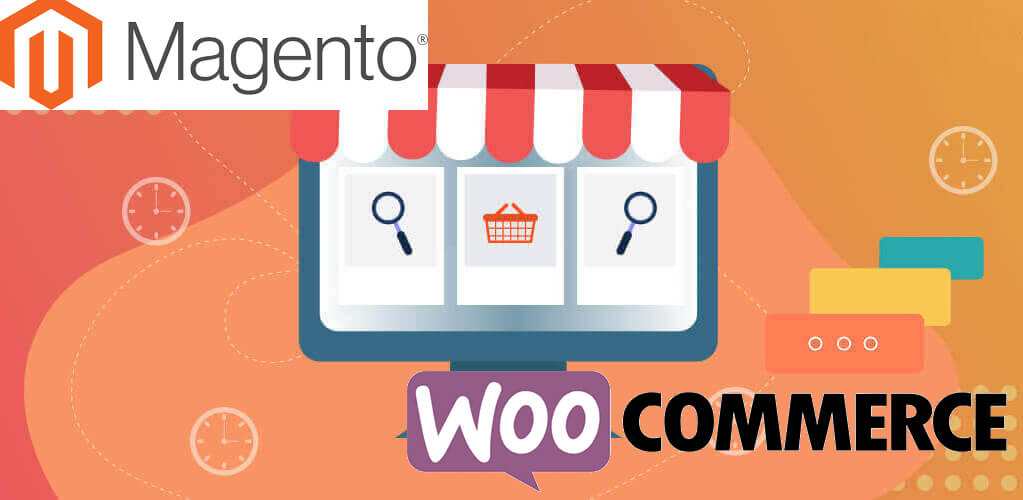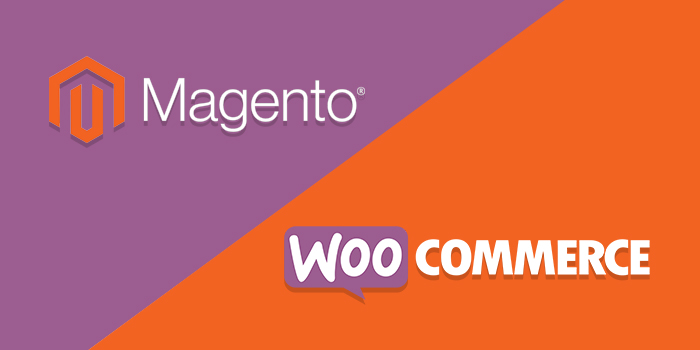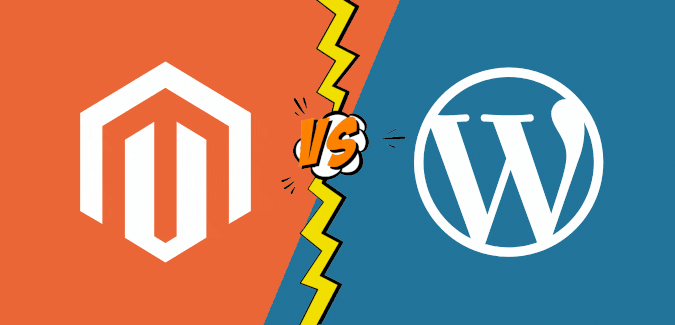
Choosing the right eCommerce platform for your website has never been an easy question for any business owner out there. And, if you are in the process of looking for your platform of choice that fits what you are selling the best. There are two choices that should come to the top of your mind Magento eCommerce and the WordPress WooCommerce combo.
Magento eCommerce and WooCommerce are the two most popular eCommerce platforms nowadays. Each platform has its own supporters that claim their platform of choice is the best. So, we are going to run you through some useful and correct information about the two above platforms, therefore you can make the right decision all by yourself.
Brief overview
Before we guide you deeper in detail of each platform, here are some brief overviews of Magento eCommerce and WooCommerce.
Magento eCommerce is the software that offers you both a free and open-source version and an enterprise version that you can either choose to self-host your website or use the cloud version that Magento eCommerce provides. Currently, Magento eCommerce is the most powerful eCommerce platform provider on the market for Small and medium business.
WooCommerce is a wonderful plugin that lets you turn WordPress into a fully functional eCommerce website. Therefore, you can take the benefit that WordPress provides and the additional eCommerce function that comes with WooCommerce.
Without any further ado, let’s take a closer look at Magento eCommerce and WooCommerce comparison
Magento eCommerce and WooCommerce comparison
1. Pricing
WooCommerce platform is a great choice as it is a free plugin that turns your WordPress into an eCommerce site, so all you have to pay for is WordPress hosting and a domain. But nothing comes for free 100%. When using WooCommerce, you will eventually realize it is limited in its capabilities, and also getting your hand on the paid plugins or themes would actually cost you some. In contrast, you can download the free edition of Magento eCommerce which provides a decent number of basic features. Being an open-source platform, Magento also offers you lots of customization for your website. You still have to pay for hosting and domain, but in the end, you will be more satisfied with these fees because of all of the advantages it offers.
2. Newcomer friendly
One of the most crucial parts when choosing which platform to use is convenience when using it. When you first start with Magento eCommerce you might feel it a bit complicated as it requires you to have at least some basic code and technical skills. There is a huge range of good features and plugins available in Magento, but it does require some skills in coding and technology. On the other hand, being a WordPress plugin, WooCommerce is easy to install and manage. It has a very beginner-friendly setup wizard that makes the installation easier and friendlier.
3. Features
| Features | Magento eCommerce | WooCommerce |
|
Themes and templates |
Wide range of free themes and templates A large amount of paid design themes and templates |
Wide range of free themes and templates A large amount of paid design themes and templates |
| Inventory management |
Add as many products as you please |
Add as many products as you please |
| Languages |
Several languages built-in |
Have to pay for the multi-language and multi-currency versions |
| Customer loyalty management |
Magento eCommerce lets you freely create and manage vouchers, coupons, and discount |
Have a limited features version built-in |
| Customer support |
Decent customer support and large community |
A blame game between WordPress and WooCommerce |
| Marketing tool |
Well known for its built-in SEO extension |
Best choice for SEO optimization |
4. Performance
Performance is yet another important factor of any website. If your website’s loading speed is slow and sloppy, no one would want to buy from it. WooCommerce provides a slightly slower speed than Magento eCommerce because it is a plugin that you add on to your WordPress. However, the performance of your website depends on many different factors, like which hosting service you use or whether your images are too heavy, not to mention the number of extensions you have on your website. Hence, there is a tie in this category.
5. Add-ons and Extensions
Regardless of how good the eCommerce is, it is still imperfect, leading to the developer of the platform allowing third-parties to create add-ons and extensions for their platform. The same thing goes for Magento eCommerce and WooCommerce. Both Magento eCommerce and WooCommerce own a large number of free and also paid versions of many add-ons and extensions made by a big community of developers, which business owners can install onto their website by themselves. However, if you don’t know anything about coding you would need some help from Magento developers in installing your desired extension properly to make it work. Installing add-ons and extensions with WooCommerce is much easier. When it comes to paid extensions, Magento eCommerce slightly costs more, but in the end, it would prove that by costing more, Magento’s extensions simply work better than WooCommerce’s once.
So, in this case, Magento eCommerce gets a bit more ahead than WooCommerce.
6. Security

According to Yell University’s research, on average 30.000 websites are hacked every day. It is very important to keep your eCommerce site secure, especially an eCommerce website. Both Magento eCommerce and WooCommerce let you apply several different security methods. WooCommerce as always is a wonderful choice for newcomers but after a short time of using it, you will realize there is some limited functionality. So does their security system, you might end up paying more than you expect to get what you desired for. In contrast, Magento eCommerce constantly releases patches and updates that help you on track to keep your website secure.
Conclusion
Both Magento eCommerce and WooCommerce are innovating eCommerce platforms. Their customer bases are indeed different from each other, WooCommerce is a perfect fit for small business owners with a small or tight budget and doesn’t have much knowledge about coding and technology. On the other hand, Magento eCommerce suits the best for Small-to-Medium businesses that have a bit more budget to spare. In conclusion, you should base on your business scale and budget to choose the right platform for your website.
Hopefully, this article can help you get on the right track when choosing the right platform for your eCommerce website.
4 Best eCommerce platforms to choose in 2020
Suggested Posts
How useful was this post?
Share it with your friends
Get our latest articles here!
Do you have any questions?
Help us improve the content of this Insightful blog by asking us questions. Manifera's team of experts will help you answer these questions as soon as possible.












